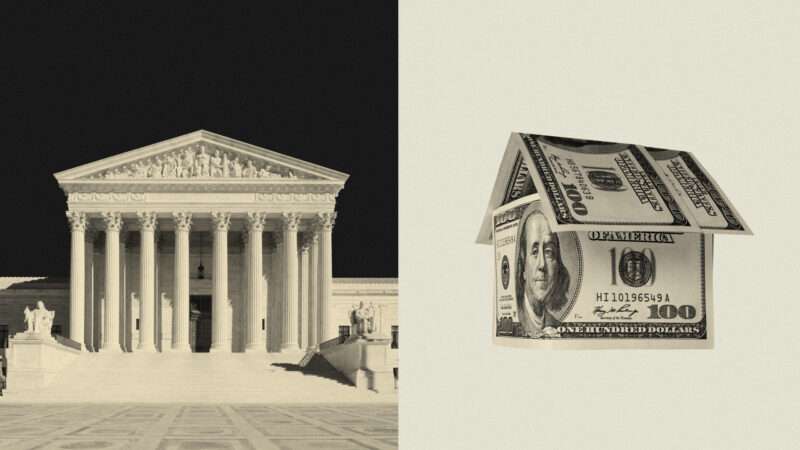
The Supreme Court on Wednesday heard arguments in a consequential case. The query before the justices: Was it unconstitutional when the government seized a woman's home over an unpaid tax bill, sold it for more than the amount of the debt, and then kept the profit?
It may sound like a slam dunk case. Over the last several years, it has not been. But yesterday's arguments provided both a glimmer of optimism for the state of property rights in the U.S., as well as a glimpse into how far the government will reach to defend its ability to violate those rights.
In 2010, Geraldine Tyler, who was in her early 80s, vacated her condominium in Hennepin County, Minnesota, after a series of local events, including a nearby shooting, left her wanting a safer environment. She was ultimately unable to afford both her new rent and her condo's property taxes, racking up a $2,300 overdue bill. Local officials added $13,000 in interest, penalties, and assorted fees. They then seized her home, sold it at auction for $40,000, and pocketed the remaining $25,000 surplus.
Multiple federal courts ruled against Tyler, who is now 94 years old, prior to her case's ascension to the Supreme Court yesterday. "Where state law recognizes no property interest in surplus proceeds from a tax foreclosure-sale conducted after adequate notice to the owner," wrote Judge Steven Colloton of the U.S. Court of Appeals for the 8th Circuit, "there is no unconstitutional taking."
That decision came down in February 2022. Christina M. Martin, a senior attorney at the Pacific Legal Foundation, sought to disabuse the high court's justices of that argument. "The county could have collected the debt without violating the Constitution by following the traditional common law rule still followed in most states and still followed in Minnesota in nearly every other debt collection circumstance," said Martin, who is representing Tyler. "Under that rule, the county should have taken the property, sold it, paid the debts from the proceeds, and refunded the remainder to Ms. Tyler. Instead, the county took everything."
It's a line of thinking the Court appeared receptive to. That became especially apparent when the justices questioned the attorney representing Hennepin County, Neal Katyal, who primarily invoked historical tradition to defend the county's right to steal Tyler's home equity.
"Are there any limits on that?" asked Justice Elena Kagan. "Take a $5,000 tax debt and a $5 million house, and the state says, thanks, we'll keep it." Katyal danced around the question until Justice Neil Gorsuch demanded a reply: "A $5 property tax, a million dollar property, good to go?" he asked.
Katyal responded that, yes, in effect, that was good to go.
It's not a hypothetical that requires an active imagination. After Tawanda Hall fell behind on the property taxes for her home in Oakland County, Michigan, the government sold it for more than $300,000, satisfied the tax burden, and kept the profit—which totaled over $286,000. "[I was] running around trying to find out who can I talk to, what can I do to stop this from happening?" she told me in January. "There was really no one there to work with us or help us or even tell us what route to go."
But it was history that Katyal primarily relied on, citing, among other things, the Statute of Gloucester, which was passed in 1278 by English Parliament. "The Statute of Gloucester was about lands owned by the feudal lord and what happens when a vassal fails to provide enough wheat to his lord and can his lands, which really belong to the lord, escheat to the lord," said Gorsuch. "And I just don't understand what on earth any of that history has to do with this case."
Kagan later echoed that: "If the mind rebels at the notion that the government can seize your $100,000 bank account and not give you back the $90,000 that you don't owe…why should…what was going on in 1200 or what was going on in 1776 change anything about that?"
Katyal also furnished a 1790 Virginia statute in making his case. When Justice Clarence Thomas inquired as to whether there was any example where it was used in a way similar to Tyler's, where the government kept the profit, Katyal replied that he had not looked for a formal case in which that had happened.
Of his inability to find a similar case, Thomas later said, "That's perhaps because [the statute] was never applied in the way that you suggest."
The core of Katyal's argument hinged on the idea that Tyler's property rights were "extinguished" when she fell behind on her taxes. It would seem that, at the least, the justices did not appear moved by that. "There were lots of great questions from the Court today," said Martin in a statement to Reason. "I hope that the Court will issue a decision holding that it is unconstitutional for the government to take more than it is owed."
An exchange toward the end of the oral arguments perhaps best epitomized Katyal's argument and the trouble it faced. Justice Amy Coney Barrett asked if the state would be justified in seizing someone's car over $20 of unpaid parking tickets. Katyal said no, because there "is no tradition that goes back that could be looked to."
"Well, there weren't cars then," Barrett replied.
The post The Government Stole Her Home Equity Over an Unpaid Tax Bill. Will the Supreme Court Vindicate Her? appeared first on Reason.com.







